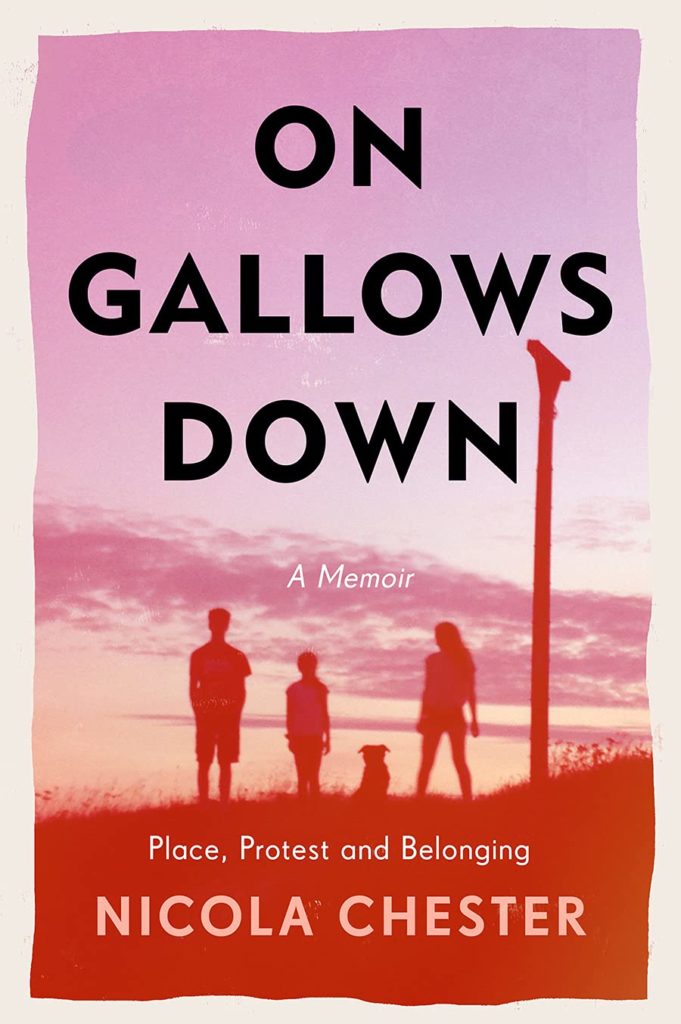Mathew Clayton reviews Nicola Chester’s ‘On Gallows Down: Place, Protest and Belonging’ — the story of a life shaped by landscape, and one of our Books of the Month for October.

One afternoon long ago I sat drinking tea with a young Ben Goldacre and tried to persuade him to write a book. What surprised me most about the meeting was his revelation that he had once been a road protester. In my mind, road protesters where well-meaning but pretty useless individuals. Ben, on the other hand, was smart and determined. He had a glint in his eye that told you he was going to do things his way or not at all. You could call that glint idealism or principles. And it was clear his principles directly underpinned his actions. I had principles but their relation to my actions were then, as now, a little vague.
The road protests had inspired a whole generation (ok part of a generation) of young people to take a stance about something they believed in. And as I sat there listening to Ben I suddenly realised that lots of them would probably go on to do interesting and meaningful things with their lives.
My prejudice against road protesters was largely based on an unfortunate few months when two members of Spiral Tribe, returning from Europe, took up residence on my couch in East London. Looking back though, I remembered that before going horizontal in Bethnal Green, they had managed to buy an East German warplane. During this time period the most politically active thing I had done was buy the Guardian. Maybe it was me that was pretty useless.
Nicola Chester’s magnificent book On Gallows Down isn’t soley about her time as a road protester, although this does feature heavily in the early sections. It is more a book about ordinary life as a non-posh person in the countryside.
The book is set around Reading. As a teenager, Nicola Chester worked in a stables and rode horses through the Peace Camps at Greenham Common, ‘along narrow tracks beside the razor wire, past armed guards in towers’. And then a few years later she joined the road protest at Twyford Down, a doomed fight to save ancient woodland that left her feeling emotionally bruised, ‘I’d watched the place I knew and loved be utterly destroyed. Ultimately there was nothing I could do about it. It was not mine in any tangible sense and I could not save it’. This is one of the themes of the book – how little power the rural working class has over the environment that means so much to them and how the people that do have ownership of the countryside are often not the best stewards. For much of the book Nicola is living in tied estate accommodation. When she moves to the village of Inkpen, she realises that it has become, ‘a desirable place to “weekend” or stay for the pheasant and partridge shooting … House prices and then rents around us rose inexorably, year on year. Our wages remain frozen’. Woven through the very moving episodes from Nicola’s life – coping with her husband being away in the Iraq war, raising her children and losing her father – there are animals: nightingales, badgers, deer, fieldfares, swallows and hares. And behind it all is the landscape that Nicola has known all her life – the places that sustain and make her.
She writes beautifully, but the thing that sets this book above most of its peers is that it feels truthful. Her writing is not performative in any way; she is not writing to impress, just to give a clear and honest account of her life and the landscape that has supported it. I think it is a future classic.
*
‘On Gallows Down’ is out now, published by Chelsea Green. Order your copy here (£20.00). You can read an extract from the book here, and read a recent interview with Nick Hayes conducted by Nicola Chester here.